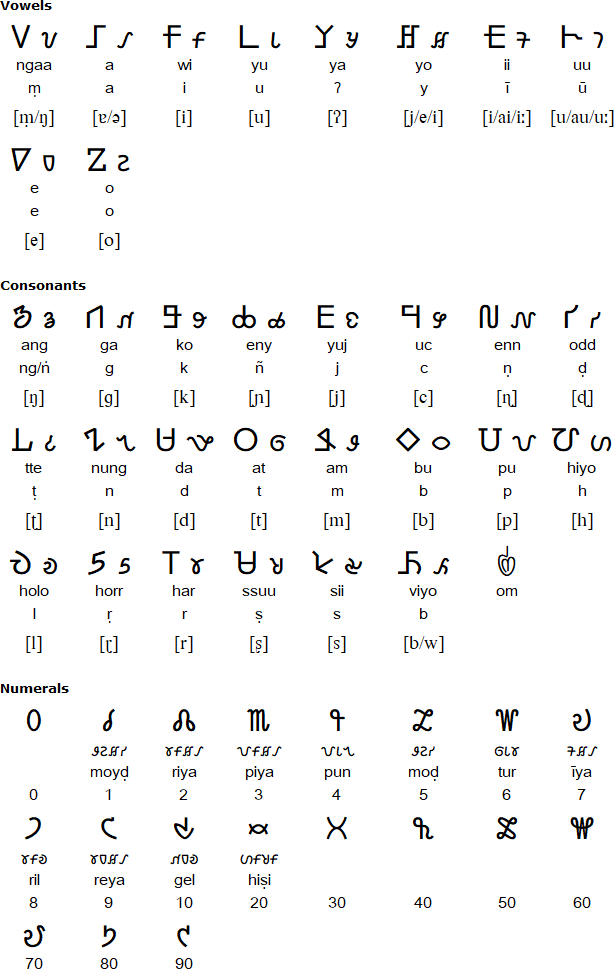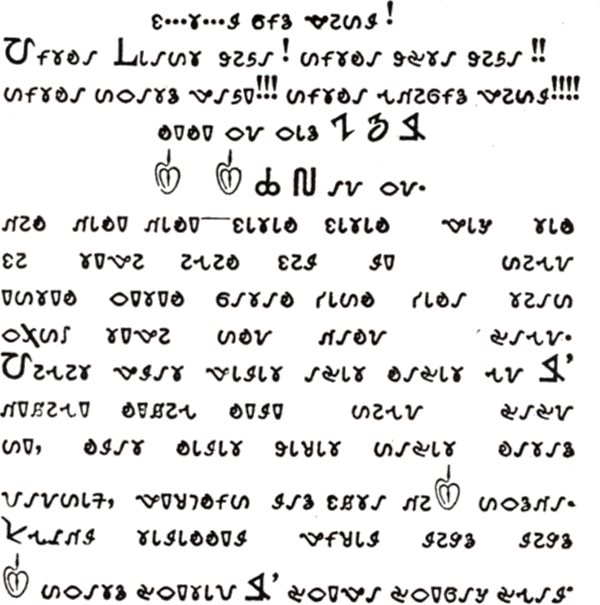The Warang Citi alphabet was invented by community leader Lako Bodra as an alternative to the writing systems devised by Christian missionaries for the Ho language, which is spoken mainly in northern India, and also in Bangladesh. He claims that the alphabet was invented in the 13th century by Dhawan Turi, and that it was rediscovered in a shamanistic vision and modernised by Bodra.
The alphabet is also known as Varang Kshiti or Barang Kshiti. In Ho is is written 𑢹𑣗𑣁𑣜𑣊 𑣏𑣂𑣕𑣂 and pronounced [wɐrɐŋ ʧɪt̪ɪ].
The alphabet is used in primary and adult education and in various publications. About 2% of people who speak Ho are literate in their language. There are also ways to write Ho with the Devanagari, Odia and Latin alphabets.

Download an alphabet chart for Warang Citi (Excel)

Source: https://www.unicode.org/L2/L2012/12118-n4259-warang-citi.pdf
Information about Ho | Warang Citi alphabet for Ho | Numbers
Information about the Warang Citi alphabet
https://en.wikipedia.org/wiki/Warang_Citi
http://www.swarthmore.edu/SocSci/langhotspots/Ho/
https://www.unicode.org/charts/PDF/U118A0.pdf
https://www.unicode.org/L2/L2012/12118-n4259-warang-citi.pdf
https://www.endangeredalphabets.net/alphabets/warang-citi/
Ahom, Aima, Arleng, Badagu, Badlit, Basahan, Balinese, Balti-A, Balti-B, Batak, Baybayin, Bengali, Bhaiksuki, Bhujimol, Bilang-bilang, Bima, Blackfoot, Brahmi, Buhid, Burmese, Carrier, Chakma, Cham, Cree, Dehong Dai, Devanagari, Dham Lipi, Dhankari / Sirmauri, Ditema, Dives Akuru, Dogra, Ethiopic, Evēla Akuru, Fox, Fraser, Gond, Goykanadi, Grantha, Gujarati, Gunjala Gondi, Gupta, Gurmukhi, Halbi Lipi, Hanifi, Hanuno'o, Hočąk, Ibalnan, Incung, Inuktitut, Jaunsari Takri, Javanese, Kaithi, Kadamba, Kamarupi, Kannada, Kawi, Kharosthi, Khema, Khe Prih, Khmer, Khojki, Khudabadi, Kirat Rai, Kōchi, Kodava Lipi, Komering, Kulitan, Kurukh Banna, Lai Tay (Tai Yo), Lampung, Lanna, Lao, Leke, Lepcha, Limbu, Lontara/Makasar, Lota Ende, Magar Akkha, Mahajani, Malayalam, Meitei (Modern), Manpuri (Old), Marchen, Meetei Yelhou Mayek, Meroïtic, Masarm Gondi, Modi, Mon, Mongolian Horizontal Square Script, Multani, Nandinagari, Newa, New Tai Lue, Ojibwe, Odia, Ogan, Pahawh Hmong, Pallava, Phags-pa, Purva Licchavi, Qiang / Rma, Ranjana, Rejang (Kaganga), Sasak, Savara, Satera Jontal, Shan, Sharda, Sheek Bakrii Saphaloo, Siddham, Sinhala, Sorang Sompeng, Sourashtra, Soyombo, Sukhothai, Sundanese, Syloti Nagri, Tagbanwa, Tai Noi, Takri, Tamil, Tanchangya (Ka-Pat), Tani, Thaana, Telugu, Thai, Thirke, Tibetan, Tigalari, Tikamuli, Tocharian, Tolong Siki, Vatteluttu, Warang Citi
Page last modified: 16.03.23
[top]
You can support this site by Buying Me A Coffee, and if you like what you see on this page, you can use the buttons below to share it with people you know.

If you like this site and find it useful, you can support it by making a donation via PayPal or Patreon, or by contributing in other ways. Omniglot is how I make my living.
Note: all links on this site to Amazon.com, Amazon.co.uk
and Amazon.fr
are affiliate links. This means I earn a commission if you click on any of them and buy something. So by clicking on these links you can help to support this site.
[top]